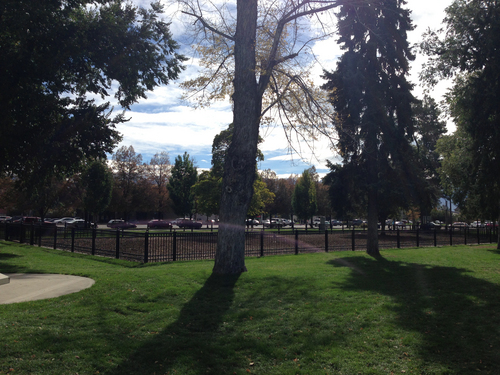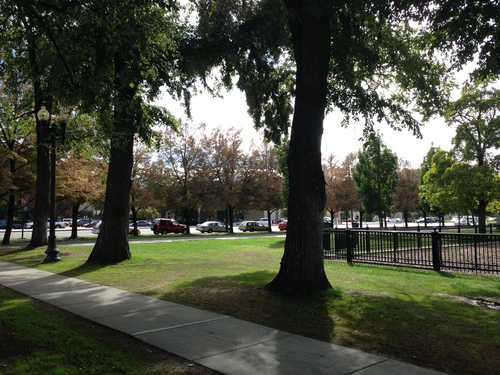This is an archived article that was published on sltrib.com in 2014, and information in the article may be outdated. It is provided only for personal research purposes and may not be reprinted.
Imagine residents of downtown Salt Lake City strolling to Pioneer Park to toss a Frisbee or spread out a picnic and enjoy the day along with other folks, who happen to be homeless.
For the nonprofit Pioneer Park Coalition, it's not an impossible dream.
Local funding for a federal-matching grant could change the face of Pioneer Park, although the proposed $1 million project appears more like a face-lift than a complete makeover.
In its continuing effort to make the park a place for everyone, Salt Lake City is partnering with Pioneer Park Coalition to seek federal funding to implement Stage II of the park master plan, adopted in 2006.
If successful, the combined local and federal funds would move trees in the center of the park to make way for an open area where such sports as soccer and lacrosse can be played. The money also would fund a new restroom.
"Pioneer Park is our only downtown park and we don't have a field of this nature in the area," said Nancy Monteith, city park planner. "This will change the physical structure and reduce the opportunity for negative behavior."
Recently, the Salt Lake City Council set aside $300,000 for Stage II of the park's 2006 master-plan improvements. The coalition will pitch in $250,000 and together they will seek a $500,000 federal grant.
If successful, the funding would be forthcoming in spring 2015.
Already the city and other entities sponsor numerous activities in an effort to make it attractive to the general public: There are trapezes, vintage cars, a farmers market, concerts and yoga (through September). "Yappy Hour" for dog owners was held earlier this week.
Stage II park improvements would be scheduled so that activities such as the Twilight Concert Series and Downtown Farmers Market would not be impacted, Monteith said. The work could be accomplished in fall and winter.
"We have a park that has activities that make people feel welcome," she said. "Everyone is welcome."
The implication, of course, includes homeless people who frequent the area because the Road Home shelter, Fourth Street Clinic and other providers are near the park.
Scott Howell, co-chairman of Pioneer Park Coalition, said the goal is not to drive away homeless people but rather to curb criminal activity that often accompanies the homeless population.
"We want to make it a family-oriented place for everybody, including our homeless brothers and sisters," he said. "But we need to enforce the law on all those who use the park."
Recently, the Salt Lake City Police Department created its Metro Support Bureau that encompasses the area from North Temple to 700 South and from Interstate 15 to State Street. Its goal is to use community policing with the help of homeless people to crack down on crime and the drug trade that has plagued the area for decades. In the coming month, the bureau will open an office at 420 W. 200 South.
Tony Caputo, who owns and operates a deli and grocery across from the park on 300 South, applauds the coalition's efforts, but he isn't convinced they will be successful.
"Anything they do over there that is community-oriented is a good thing," he said. "But when those [homeless] guys get moved out by other activities, they come and hang out in my restroom."
Most of the homeless population is "benign," he added. But the "criminal element" among them continues its lawlessness.
"This is a societal problem with mental illness that takes many forms," he said. "We're putting a fresh coat of paint on a problem that takes far more than anyone in our society is willing to put forth in a meaningful way."
Nonetheless, Howell and members of the coalition, who represent more than a dozen public and private-sector organizations, are pressing forward.
"I don't blame the Pete Hendersons [owner of the Rio Grande Cafe] and the Tony Caputos who have lived through this for so many years," Howell said. "What's different for us is that we're looking for a total solution."
The coalition's plan considers housing, job training, job searches and health care, among other things.
In its first year of organization, the park has seen remarkable improvement, Howell added.
"I'm amazed at what we've accomplished in the past year," he said.





